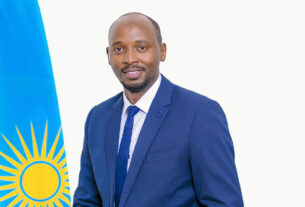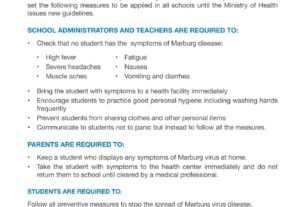According to the Rwanda Biomedical Center( RBC), strokes regard for 831 deaths annually, making it the fifth leading cause of death in the country. This intimidating statistic was stressed during a recent event on October 29, 2024, which brought together the RBC, the Private Sector Federation( PSF), healthcare professionals, and stroke survivors to commemorate the International Day for Stroke mindfulness. The day concentrated on raising mindfulness about the troubles of stroke, its impact on individualities and families, and the significance of early opinion and treatment.
A stroke is a serious medical condition that occurs when there’s a unforeseen dislocation of blood inflow to the brain, frequently caused by an beginning health issue similar as heart complaint or high blood pressure. This interruption can affect in brain damage, and if not treated incontinently, can lead to endless disability or death. still, if linked and treated instantly, numerous strokes can be managed effectively, and the damage can be minimized. Experts stress the significance of nippy medical intervention to increase the chances of recovery.
The head of the Department of Infectious conditions at RBC emphasized the urgency of seeking medical help at the first sign of stroke symptoms. He explained,” We see 831 people die from stroke every time, and it’s one of the top five causes of death in Rwanda.” He prompted individualities to act snappily and seek medical attention incontinently, as timely intervention can significantly ameliorate issues. There are two primary types of strokes one caused by the rupture of blood vessels( hemorrhagic stroke) and another due to blockages in the highways( ischemic stroke). Both types bear immediate medical attention to help farther damage.
presently, treatment for stroke is initiated at King Faisal Hospital, one of Rwanda’s commanding medical installations, but the government is laboriously exploring options to expand these services to hospitals across all businesses to insure that essential care is accessible to further cases. This action is aimed at adding access to life- saving treatment and reducing the number of stroke- related deaths.

The RBC functionary also advised that stroke does n’t distinguish; anyone can be affected, anyhow of age, socioeconomic status, or life. He stressed,” nothing is vulnerable to stroke. It’s not just the rich or the youthful who witness it.” This statement underscores the unpredictability of stroke, which can strike anyone at any time. The public health communication emphasizes that everyone should be apprehensive of the symptoms and seek immediate medical attention if they witness any of the warning signs.
The Private Sector Federation( PSF) is laboriously promoting mindfulness about stroke within the private sector, encouraging individualities to prioritize their health while maintaining productivity. Rusangwa Leo Pierre, the Director of the Health Department at PSF, stressed the significance of balancing work and health, stating,” No bone
can succeed in business when they’re bad.” By prioritizing stroke forestallment and mindfulness, the PSF aims to reduce the impact of stroke on the pool and ameliorate the overall well- being of workers in Rwanda.
One of the most important moments of the event came when stroke survivor Mbabazi Peace participated her particular experience. She described her stroke as a disorienting event, comparing it to a magical circumstance when she suffered her stroke in 2008. Her evidence underscores the changeable and unforeseen nature of the complaint. Peace explained how she was originally ignorant of the soberness of her condition, but with prompt medical attention, she was suitable to recover. Her story highlights the significance of not ignoring early signs of stroke and underscores the significant part that timely intervention plays in perfecting issues.
The RBC has outlined crucial symptoms of stroke to help individualities identify the condition beforehand. These include facial drooping, weakness on one side of the body, vocalized speech, and difficulty using one arm. Anyone passing these signs should seek medical backing incontinently, as early treatment within three hours can dramatically increase recovery chances. In fact, if a stroke case receives treatment within this window, the success rate of recovery can be as high as 80. This statistic emphasizes the critical significance of acting snappily in the event of a stroke.
Prevention is another crucial focus of the event. The RBC and other health associations are stressing the significance of espousing healthy life habits to reduce the threat of stroke. Precautionary measures are pivotal in reducing stroke threat. Recommendations include maintaining a balanced diet low in swab, managing weight, exercising regularly, and icing acceptable sleep. also, avoiding smoking, limiting alcohol consumption, and managing stress are vital way in lowering stroke threat. These life changes can help individualities maintain good cardiovascular health and reduce the liability of passing a stroke.

As Rwanda continues to address the impact of stroke, mindfulness and education remain crucial factors in combating this significant health issue. With the uninterrupted sweats of associations like the RBC and the Private Sector Federation, progress is being made in raising mindfulness about the significance of early discovery and treatment. The ultimate thing is to reduce the number of stroke- related deaths and ameliorate the quality of life for stroke survivors in the country.
The theme of the International Day for Stroke mindfulness serves as a memorial that stroke forestallment is within our control. By educating the public, raising mindfulness, and encouraging individualities to take responsibility for their health, Rwanda can begin to make significant strides in the fight against stroke. The cooperative sweats of healthcare providers, the private sector, and stroke survivors are essential in fostering a culture of mindfulness and forestallment.
Eventually, it’s pivotal for everyone to flash back that stroke can affect anyone at any time, and feting the warning signs and seeking prompt medical attention can make all the difference. By espousing healthy habits and being watchful about the symptoms of stroke, individualities can reduce their threat and ameliorate their chances of survival if they’re ever affected by this potentially life- hanging condition. Rwanda’s continued focus on stroke mindfulness and forestallment is a positive step toward reducing the burden of stroke on the nation and perfecting the health and well- being of its people.



